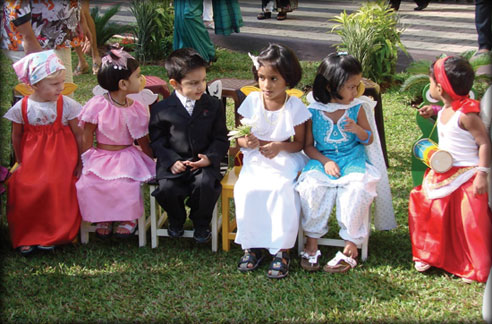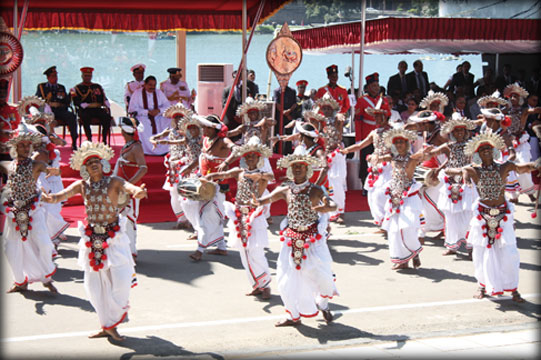Nurturing ethnic harmony for sustainable development
By Lionel Wijesiri
Last week, I had the opportunity of reading an essay written by a
student of Grade 10 on ethnic harmony. I quote one paragraph: "People
would like to see an ethnic problem disappear. And the way they think
it's going to disappear is by not talking about it. But, I think, the
real way you can make it disappear is by talking about it, learning
about it, and understanding it. Then you'll see a change."
|

Unity among different ethnicities is beautifully displayed
by these children. If this trend is continued throughout
their lives, this nation would prosper. |
If this student was voicing the common concerns of the modern youth,
we are a fortunate nation. The formation of the great 'national family',
consisting of all people of the country, notwithstanding the differences
in ethnicity or religion, which we were expecting since our Independence
in 1948, will become a reality within the next few decades.
Ask a dozen adults what ethnic harmony is, and you'll probably get a
dozen different answers. Ethnic harmony is an evolving concept that few
can foresee in its final form. What is evolving is how we interact with
and perceive those who are different from us. We know that most of these
differences are superficial and unimportant. Yet, for many, these minor
differences are what they focus on first. Where did we learn it, and,
how can we unlearn it?
As the National Day 2014 dawns in two days, these are the questions
we have to answer. If we are honest to ourselves, listen to our hearts,
and find the right answers, we can look forward to becoming a unified
nation in double-quick time.
Out of our own experiences, we know that national identities and
loyalties are mainly threatened from within (rather than from outside)
and they are quite real.
This phenomenon is not exclusive to our country. Throughout the
world, the possibility of 'nations within states' and of internecine
conflict along religious, ethnic and linguistic lines seem ever present.
The former Yugoslavia is perhaps the most prominent illustration of
state disintegration amid clashes between ethnic and religious groups
with aspirations to nationhood. The cases of Southern Sudan, Chechnya
and Iraq are three more recent examples.
Significant mobilisations
Moreover, there have also been less famous, but still significant
mobilisations along ethnic lines in other areas of the world, such as
Latin America. Even in the United States, some worry that American
identity is challenged by growing ethnic diversity, especially when that
very diversity is celebrated under the guise of multi-culturalism or the
'politics of recognition'.
Sixteen years after Independence, it's time for us to take a cue from
our own experiences. We need to begin investigating more systematically
the variation in 'attachment' among the different ethnic and religious
segments of our population to the motherland. We should focus in
particular on how our populations that are 'minority' in terms of
ethnicity, religion and language feel about their country.
In this investigation, we should seek to answer two questions. First,
do our minority populations feel less attached to the country in which
they live? Second, what political, economic, and cultural factors
strengthen or weaken the national attachment of minority populations?
To answer these questions, we have to formulate our concept of what
is meant by 'attachment' to the country. The writer has intentionally
used the common term 'attachment' to characterise people's feelings
because it is a general description and does not imply any particular
kind of attachment (love, pride, and so on) or any specific content of
that attachment.
What is meant is a very general sense of one's identification with
one's country. Others may have different definitions, such as
'patriotism' and 'nationalism'. These can be very important, of course,
but only for determining the consequences of national attachment.
Dimensions
Two important dimensions of a nation's political institutions are
economic development and political freedom. Generally, citizens in
economically developed countries have a stronger national attachment
because they experience a considerable degree of personal freedom and
ease of living.
|

National Day celebrations |
Citizens living in developing countries, on the other hand, often
experience substantial hardships relative to citizens in developed
countries. As such, they may feel less attachment to their country. This
means, national attachment may not arise solely because of myths and
imaginings, but may have a quite rational basis in living conditions and
freedom.
The experience of nation building suggests that ethnic pluralism and
cultural blending have been a continuing process in most successful
countries. A multi-religious and ethnic identity can itself become over
time a source of national identity.
However, historical experience also suggests that blending can only
be forced at high resource costs. The 'melting pot' metaphor (practised
in the USA) has seldom applied when a country consists of geographically
based ethnic nationalities.
Understanding fully the gravity and importance of ethnic harmony, the
Government has increased investments in infrastructure and public
utilities in the North and the East and accelerated their opening to the
outside world. This has begun to result in an upsurge of economic
development in these areas. This is a step in the right direction.
Role of schools
At the same time, we must understand that children and young people
are perhaps the key to realising true ethnic harmony. They are the first
to adapt to new technologies, the first to consider new possibilities
and new ways of thinking. Young people tend to ignore superficial
differences, and make friends with people from all strata of society - a
key component to building harmony and international understanding.
This writer believes that there is an urgent need for successful
strategies to implement in our schools - strategies to dispel racial
tensions and violence (particularly violence related to race or
ethnicity) and to create a vision that includes students of diverse
backgrounds understanding of cultural differences.
A growing number of educators are becoming aware of a lack of
attention to diversity issues in the preparation of school leaders.
Administrative preparation programs have traditionally emphasised
management skills and have not given adequate attention to the need to
mediate the new diversity that characterises many urban and suburban
schools. If schools are to become more like the ones in the study - safe
and respectful environments where positive inter-ethnic relations can
flourish - policy makers, principals and others need to make inter-group
relations a priority area in education and take appropriate action.
The ideal relationship among our ethnic groups one day should reach a
level when we can describe it as 'overall integration and mutual
interaction'. Until four decades ago, concentrations of ethnic
minorities resided within predominantly 'Sinhala areas', and the
Sinhalese people also resided in 'minority areas', indicating that there
have been extensive exchanges among our ethnic groups since ancient
times.
With the development of the market economy, interaction among ethnic
groups has become even more active in the areas of government,
economics, culture, daily life and marriage.
Linked by inter-dependence, mutual assistance and joint development,
their common goals and interests creating a deep sense of solidarity,
Sri Lanka's ethnic groups should become a great national family,
together building a Sri Lankan civilisation. |

